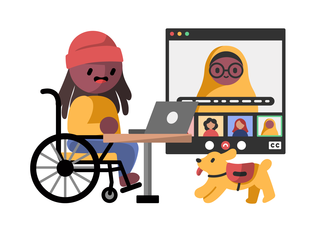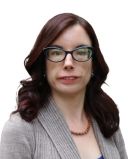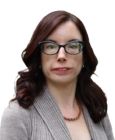Coronavirus Disease 2019
COVID-19 Disabled Everyone. Disabled People Knew What to Do.
Experiences of disabled people during the pandemic highlight hard-won expertise.
Posted November 16, 2022 Reviewed by Gary Drevitch
Key points
- A new study conducted during COVID-19 revealed that many disabled people already had skills and adaptations to help them navigate the pandemic.
- A critical source of disabled people’s expertise is interdependence, or recognizing the value of interconnectedness, support, and mutual aid.
- Interdependence can shift perspectives toward protecting the health of communities.

Coauthored with Joan M. Ostrove, Jonathan M. Adler, and Robert B. Manning III
Despite possessing extensive wisdom, experience, and knowledge, disabled people are rarely seen – especially by non-disabled people – as sources of expertise. Could the COVID pandemic change that? Data from our recently published study suggest that it could. Consider these comments from two participants in our study:
"Most of the changes we need to make to be safe during a pandemic were already part of my day-to-day life. I realized how much wisdom, skill, and resourcefulness I had gained because of my disability long before the pandemic. As a disabled person, I already had the skills, the mindset, and the knowledge to survive this. I already had masks and hand sanitizer. I already knew how to do nearly everything by Skype or Zoom. I had been doing all of this for a lifetime. When COVID turned the rest of the world upside down, I felt steady, skilled, and confident."
"Since I am disabled, I have pre-pandemic skills in the… areas [of virtual facilitation and teaching]. … [During] job-related trainings, I was able to demonstrate my pre-existing skills and explicitly remind my co-workers that disabled people have been experts about these things for a long time. I also used these trainings as moments to advocate for the continued common use of virtual/remote participation for employees (and in my setting, students as well). I've emphasized that this is not something that should disappear whenever we reach post-pandemic life. Disabled people aren't going anywhere and have so, so much to contribute across society."
The data for this study came from a larger online survey that investigated the mental health challenges of adults with disabilities in the United States during Fall 2020. As part of the survey, participants were asked to share, in their own words, what the pandemic had been like for them: What was a low point? What about a high point? We also asked participants to share a specific moment when their experience as a disabled person was especially salient or clear.
Our study revealed that, far beyond having the skills to navigate our newly remote and digital life, one critical source of disabled people’s pandemic-navigating expertise is a deep experience of interdependence with others. Interdependence – in contrast to both independence and dependence – is a way of being in the world that is grounded in relationship, reciprocity, and the recognition that (as Mia Mingus put it) “we need each other.” For many disabled adults, the pandemic put into strong relief the ways in which they were deeply connected to others and were part of a broader collective of disabled people. It highlighted the benefits of interconnection among people with disabilities in providing one another with social support and mutual aid, using technology in creative and innovative ways, fostering disability identity, and promoting advocacy. For example, one of the participants in our study wrote:
"I remember the first few hours of the first Zoom session vividly. I sat alone in my living room, and listened to [the facilitator] and a cohort of mostly-Black, mostly-femme people share their experiences. I only sat and watched, but it was an intense experience. Attending that first session, I felt shocked and elated to find people who looked and acted like me, confidently and eloquently discussing ideas I’d harbored (in a muddled way) as my own, isolated, secret, taboo hopes and dreams. I’d always felt my individual disability’s difficulties and blessings, but I’d never really considered that disability can mean community and identity, and the idea excited and comforted me. That experience stands out to me for its difference; a time when I felt my disability could bring me into community, when most days my experiences are primarily of disability inflicting isolation."
Another participant, explicitly naming the value of interdependence as she reflected on her experiences as a disabled person during the pandemic, shared:
"In non-pandemic times, I receive a good deal of support from friends, including helping me with chores or prompting, helping me get out of my apartment and go for walks, and helping to make sure I am taken care of. When my friends couldn't stop by to help me and I couldn't go anywhere, I was suddenly quite aware of this level of support. I also have friends who support me from a distance via texts and calls, who were still able to help me. This moment stands out because it emphasizes how much I and others rely on our support networks to get through our daily life. It shows me that interdependence is a value and reality in my life, and makes me grateful for the friends who help me survive and thrive."
Interdependence had some challenging downsides in the context of the pandemic, too. Living life in close relationships to others, and sometimes relying on them to get basic needs met, meant a heightened risk of exposure to COVID-19. The early, pre-vaccine days were particularly harrowing and scary; the conditions of pandemic life put some people in an impossible bind: “I can't survive without help from others but those people may also end up killing me by bringing COVID into my home. I am in the high-risk category since I can't even cough without someone helping me.”
Another participant wrote:
"I think the pandemic has brought to light exactly how much my independence as a blind person relies on other people/services like grocery delivery, ride share services, etc. … How could I independently and safely get a COVID test or medical care for myself or my son if we all got sick and my husband couldn't drive us? Going places suddenly seemed much more risky as I couldn't see where other people were in order to stay socially distant, and I couldn't use tape markings, etc. on floors to stay in my proper place in lines. I also feel like I have to touch more surfaces as a blind person which also increased my risk. And I didn't like that my choice seemed to be between dependence and increased risk to my and my family's health."
Although people with disabilities recognized the value of interdependence and the problem of ableism long before the COVID-19 pandemic, their experiences during the pandemic offer an opportunity to emphasize the benefits of living life in a way that challenges the particularly American myth of independence. The stories told by the disabled adults in our study disrupted traditional narratives of independent agency and individual action. Instead, they acknowledged — as many cultures do — that survival and fulfillment are dependent on obligations of care at the interpersonal and community levels. As one participant said, the pandemic “disabled everyone,” bringing to light adaptations many people with disabilities already used. People with disabilities have been pioneers in understanding what it means to be interdependent and their wisdom may be especially important for all of us during these pandemic times and beyond. Understanding our interdependence not only promotes behaviors that actually curtail the spread of disease, like getting vaccinated and wearing masks, but also shifts our perceptions in a way that elevates a culture of care and access.
Jonathan M. Adler, PhD is Professor of Psychology at Olin College of Engineering and Editor of Personality and Social Psychology Review.
Joan M. Ostrove, PhD is Director of the Jan Serie Center for Scholarship and Teaching and Professor of Psychology at Macalester College.
Robert Manning III is a research assistant in the Department of Social and Behavioral Sciences at the Yale School of Public Health.




